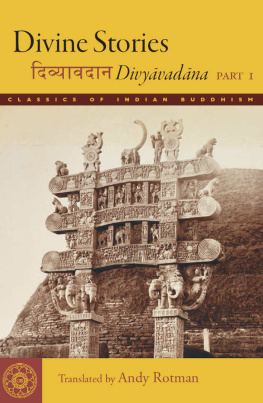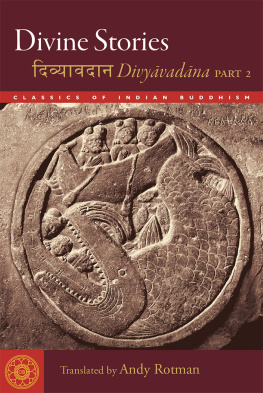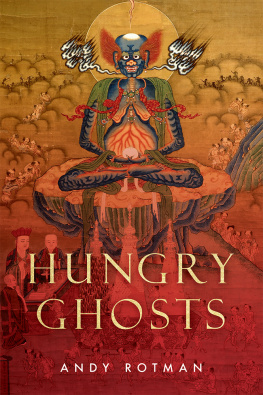Andy Rotman - Divine Stories: Divyāvadāna, Part 1
Here you can read online Andy Rotman - Divine Stories: Divyāvadāna, Part 1 full text of the book (entire story) in english for free. Download pdf and epub, get meaning, cover and reviews about this ebook. year: 2013, publisher: Wisdom Publications, genre: Religion. Description of the work, (preface) as well as reviews are available. Best literature library LitArk.com created for fans of good reading and offers a wide selection of genres:
Romance novel
Science fiction
Adventure
Detective
Science
History
Home and family
Prose
Art
Politics
Computer
Non-fiction
Religion
Business
Children
Humor
Choose a favorite category and find really read worthwhile books. Enjoy immersion in the world of imagination, feel the emotions of the characters or learn something new for yourself, make an fascinating discovery.
- Book:Divine Stories: Divyāvadāna, Part 1
- Author:
- Publisher:Wisdom Publications
- Genre:
- Year:2013
- Rating:4 / 5
- Favourites:Add to favourites
- Your mark:
- 80
- 1
- 2
- 3
- 4
- 5
Divine Stories: Divyāvadāna, Part 1: summary, description and annotation
We offer to read an annotation, description, summary or preface (depends on what the author of the book "Divine Stories: Divyāvadāna, Part 1" wrote himself). If you haven't found the necessary information about the book — write in the comments, we will try to find it.
Divine Stories: Divyāvadāna, Part 1 — read online for free the complete book (whole text) full work
Below is the text of the book, divided by pages. System saving the place of the last page read, allows you to conveniently read the book "Divine Stories: Divyāvadāna, Part 1" online for free, without having to search again every time where you left off. Put a bookmark, and you can go to the page where you finished reading at any time.
Font size:
Interval:
Bookmark:
Divine Stories
CLASSICS OF INDIAN BUDDHISM
The flourishing of Buddhism in South Asia during the first millennium of the Common Era produced many texts that deserve a place among the classics of world literature. Exploring the full extent of the human condition and the limits of language and reason, these texts have the power to edify and entertain a wide variety of readers. The Classics of Indian Buddhism series aims to publish widely accessible translations of important texts from the Buddhist traditions of South Asia, with special consideration given to works foundational for the Mahyna.
Editorial Board
Paul Harrison, Stanford University
Jens-Uwe Hartmann, University of Munich
Sara McClintock, Emory University
Parimal Patil, Harvard University
Andy Rotman, Smith College
Akira Sait, University of Tokyo
THE DIVYVADNA
The Divyvadna is a large collection of Indian Buddhist stories written in Sanskrit from the early centuries of the Common Era. These stories have frequently been used in the moral education of monastics and laypeople, and they have often been considered to be the word of the Buddha himself. These stories have since spread throughout Asia, as both narrative and narrative art, leaving an indelible mark on Buddhist thought and practice. Representations of these stories can be found across Asia, from Kizil in China to Sanchi in India to Borobudur in Indonesia. It is not hyperbole to say that these are some of the most influential stories in the history of Buddhism. This volume contains the first half of the stories in the collection.

Wisdom Publications, Inc.
199 Elm Street
Somerville MA 02144 USA
www.wisdompubs.org
2008 Andy Rotman
All rights reserved.
No part of this book may be reproduced in any form or by any means, electronic or mechanical, including photography, recording, or by any information storage and retrieval system or technologies now known or later developed, without permission in writing from the publisher.
Library of Congress Cataloging-in-Publication Data
Tripiaka. Strapiaka. Avadna. Divyvadna. English.
Divine stories : Divyvadna / translated by Andy Rotman.
p. cm.
Translated from Sanskrit.
Includes bibliographical references and index.
ISBN 0-86171-295-1 (pbk. : alk. paper)
ISBN 978-0-83171-831-3 (ebook)
1. Buddhist literature, SanskritTranslations into English. I. Rotman, Andy, 1966 II. Title.
BQ1562.E5R68 2008
294.3'823dc22
2008016709
12 11 10 09 08
5 4 3 2 1
Cover and interior design by Gopa&Ted2, Inc. Set in Diacritical Garamond Pro 11.75/15.75.
Cover photograph of the Sanchi stpa, North Gate, by Raja Deen Dayal, circa 1880s, is printed with permission of the Royal Ontario Museum.
Wisdom Publications books are printed on acid-free paper and meet the guidelines for permanence and durability of the Production Guidelines for Book Longevity of the Council on Library Resources.
Printed in the United States of America.
 This book was produced with environmental mindfulness. We have elected to print this title on 30% PCW recycled paper. As a result, we have saved the following resources: 26 trees, 18 million BTUs of energy, 2,327 lbs. of greenhouse gases, 9,659 gallons of water, and 1,240 lbs. of solid waste. For more information, please visit our website, www.wisdompubs.org. This paper is also FSC certified. For more information, please www.fscus.org.
This book was produced with environmental mindfulness. We have elected to print this title on 30% PCW recycled paper. As a result, we have saved the following resources: 26 trees, 18 million BTUs of energy, 2,327 lbs. of greenhouse gases, 9,659 gallons of water, and 1,240 lbs. of solid waste. For more information, please visit our website, www.wisdompubs.org. This paper is also FSC certified. For more information, please www.fscus.org.
To my teachers,
who have given me so much

Bharthari, Ntiataka

Publishers Acknowledgment

The publisher gratefully acknowledges the generous help of the Hershey Family Foundation in sponsoring the production of this book.

Table of Contents



Meritorious deeds are to be performed.
Not performing meritorious deeds brings suffering.
Those who perform meritorious deeds
can rejoice in this world and in the next.
The Divyvadna
I T IS MY HONOR to have this translation of the first half of the Divyvadna presented as the inaugural volume in the new Classics of Indian Buddhism series. I believe that the Divyvadna is an excellent choice to launch the series, for it encapsulates much of what is distinctive and inspiring about classical Indian Buddhism. Here one is introduced to various people, places, and philosophies of the Middle Country, with the Buddha and his disciples as the star performers. Traveling through the kingdoms of Koala, Magadha, and beyond, they encounter characters from all walks of life: animal, human, divine, and demonic. In these encounters, they teach the dharma by word and deed, generating faith and new converts, as well as illustrating for the listener the merits of the Buddhist path.
The avadnas, or stories, in the Divyvadna have traditionally served as a means of sharing Buddhist teachings with a broad audience of both monastics and laypeople, and this, too, makes the present volume a good choice for launching the Classics of Indian Buddhism series. The aim of the series is to present Buddhist texts that were influential within classical India in a way that both specialists and more general readers can appreciate. To this end, translations are meant to combine accuracy with readabilitya tall task indeed. I have tried to succeed on both accounts, providing readers with a glimpse of Indian Buddhism that complements and enriches the perspective gained from more contemporary works.
I first began studying the Divyvadna as a graduate student at the University of Chicago, and the critical study of the text that began as my dissertation is being published simultaneously by Oxford University Press (Rotman 2008). That book, Thus Have I Seen: Visualizing Faith in Early Indian Buddhism, can be read as a companion to this translation. In it I consider faith as a visual practice in Buddhism, and how seeing and faith function as part of overlapping visual and moral economies. In particular, I analyze the mental states of raddh and prasdaterms rendered as belief and faith in this translation; how these relate to practices of seeing (darana) and giving (dna); and what this configuration of seeing, believing, and giving tells us about the power of images, the logic of pilgrimage, and the function of narratives in Buddhist India.
Next pageFont size:
Interval:
Bookmark:
Similar books «Divine Stories: Divyāvadāna, Part 1»
Look at similar books to Divine Stories: Divyāvadāna, Part 1. We have selected literature similar in name and meaning in the hope of providing readers with more options to find new, interesting, not yet read works.
Discussion, reviews of the book Divine Stories: Divyāvadāna, Part 1 and just readers' own opinions. Leave your comments, write what you think about the work, its meaning or the main characters. Specify what exactly you liked and what you didn't like, and why you think so.










